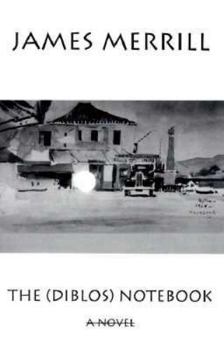(Diblos) Notebook
Select Format
Select Condition 
Book Overview
Best known as a poet, James Merrill is also an accomplished novelist, and in The (Diblos) Notebook artfully lays bare the process of writing a novel. A young American writer keeps a notebook that... This description may be from another edition of this product.
Format:Paperback
Language:English
ISBN:1564780643
ISBN13:9781564780645
Release Date:November 1994
Publisher:Dalkey Archive Press
Length:151 Pages
Weight:0.50 lbs.
Dimensions:0.5" x 5.5" x 8.5"
Related Subjects
Anthologies Contemporary Education & Reference Fiction Literature & Fiction Short StoriesCustomer Reviews
1 rating
4 ½* Poetic Narrative
Published by Thriftbooks.com User , 21 years ago
Another gem from the Dalkey publishing house, this exploration of creativity reads beautifully. For the most part, it succeeds both as literary experiment and as narrative. Author James Merrill is a poet, and his imagery and poetic structure are the major attraction of this "book within a book." Merrill's protagonist, Sandy, struggles with a novel he's writing about his family and their experiences on the Greek island of "Diblos." Merrill's conceit is that his (Merrill's) book is really the notebook of author "Sandy." There are two types of entries in this notebook: Sandy's draft of a novel, complete with edits, restarts, notes to himself, etc., and Sandy's journal about his "real life" and people and experiences from which he derives much of his novel. I won't be giving away too much by providing a brief key to the names of characters in Sandy's novel and their counterparts Sandy's life. "Orestes" is the draft novel 's name for Orson, Sandy's half-brother. "Dora" (the older woman unnamed at the start of Sandy's novel), Orestes' friend and lover, is based on Dora, friend and lover of Orson on Diblos who later accompanies him to New York City. "Sandy" remains unnamed in the novel, but is Orestes' half-brother. "Arthur Orson" is Orson's godfather; his place in the novel is not yet resolved."The (Diblos) Notebook" is not as confusing as it may sound, and the writing is evocative and beautifully impressionistic: "The islands of Greece Across vivid water the islands of Greece lie. They have been cut out of cardboard and set on bases of at subtle odds with one another, upon bases of pale haze. Their colors are mauve, exhausted blue, tanned rose, here and there crinkled to catch the light. They do not seem It is inconceivable that they are of one substance with the warm red rock underfoot" These fits and starts are especially prevalent in the beginning of Merrill's book, and (as he notes in his 1994 afterword) are his attempt to show that, contrary to the notions of some Beat writers, the first creative impulse is not always the best. Sometimes revision improves writing. What I found just as interesting, though, were the sentences in which the original sounded truer, as if the revisions were trying to hide certain emotions. The editing device, with the fragments that resemble poetry and the hints at repression get somewhat tiring after awhile, and Merrill focuses more on straightforward narrative in the well-paced second half. His presentations of brilliant, vain Orson, insightful but isolated Sandy, and the contrasts between Greece and New York read easily and are as insightful as the more overtly psychological revisions. It's an interesting book, rich with such pleasures. At times the book is challenging, and Merrill perhaps overplays his "experiment," but it's also one of those books that reveals more pleasures with each rereading (whether of the whole book or just sections). This book was well received by the cr





